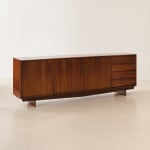






















Carlo Hauner and Martin Eisler
Caviuna
H 37.01 in. x W 114.18 in. x D 18.12 in.
Further images
-
(View a larger image of thumbnail 1
)

-
(View a larger image of thumbnail 2
)

-
(View a larger image of thumbnail 3
)

-
(View a larger image of thumbnail 4
)

-
(View a larger image of thumbnail 5
)

-
(View a larger image of thumbnail 6
)

-
(View a larger image of thumbnail 7
)

-
(View a larger image of thumbnail 8
)

-
(View a larger image of thumbnail 9
)

-
(View a larger image of thumbnail 10
)

-
(View a larger image of thumbnail 11
)

-
(View a larger image of thumbnail 12
)

-
(View a larger image of thumbnail 13
)

-
(View a larger image of thumbnail 14
)

-
(View a larger image of thumbnail 15
)

-
(View a larger image of thumbnail 16
)

-
(View a larger image of thumbnail 17
)

-
(View a larger image of thumbnail 18
)

-
(View a larger image of thumbnail 19
)

-
(View a larger image of thumbnail 20
)

-
(View a larger image of thumbnail 21
)

-
(View a larger image of thumbnail 22
)

-
(View a larger image of thumbnail 23
)

This Caviuna Credenza was designed by Martin Eisler (1913-1977) for Forma S.A. Móveis e Objetos de Arte in the 1950s.
This furniture typology was very common at the period, appearing in several interior projects published in the most known design and lifestyle magazines. The credenzas are traditionally used in the dining rooms for storage and displaying serving drinks and dishes, but this incredible piece is much more than a functional design.
Extraordinarily complex and hand-crafted, the wood pieces produced by Forma Móveis e Objetos de Arte in Brazil in the 1950s have unique construction details, very distinctive of any production of the time in Brazil.
This credenza touches the ground at a minimum, with delicate feet. The piece is composed of three-door compartments with iternal shelves and four carefully made drawers without handles – the design allows it to be pulled from the angled bottom.